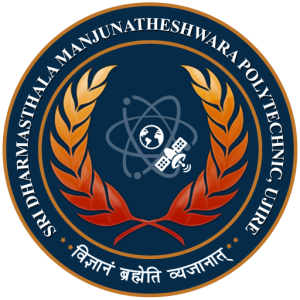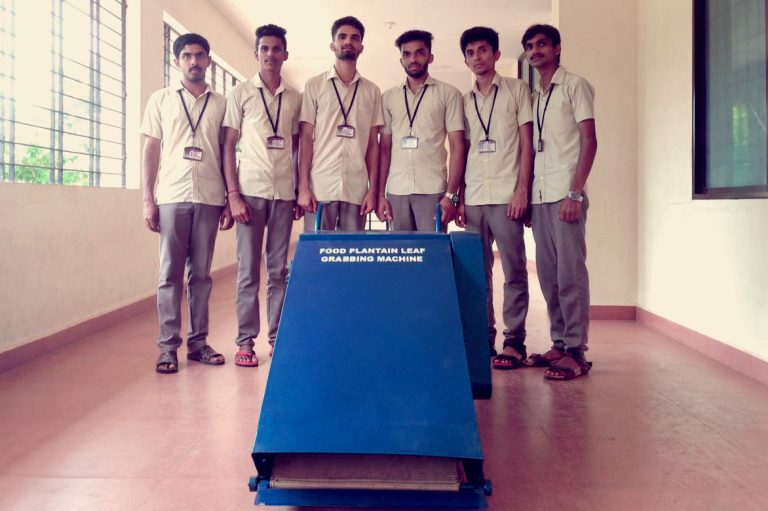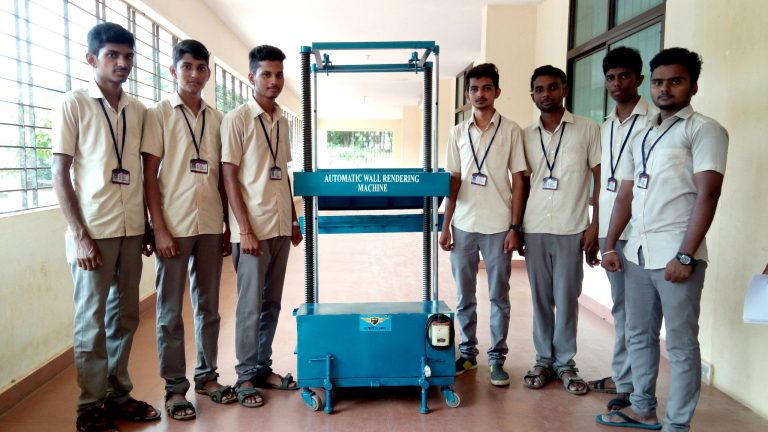Mechanical Engineering
Mechanical engineering is a diverse and fundamental branch of engineering that focuses on designing, analyzing, and manufacturing mechanical systems and devices to meet a wide range of human and industrial needs. Mechanical engineers apply principles of physics, mathematics, and material science to create solutions for problems related to machinery, energy systems, transportation, manufacturing processes, and more. This field plays a pivotal role in shaping the modern world, impacting areas from aerospace and robotics to renewable energy and healthcare, making it an indispensable discipline in the engineering landscape.
VISION
To create competent and skilled mechanical engineers with sound technical knowledge to cater the needs of the industries and the society
MISSION
- To impart quality technical education to students by providing excellent teaching & learning facilitiesfor easy adaptation to industry and higher learning
- To provide industry based practical experience and skills necessary for innovation, employability and global competency with the help of internship.
- To promote leadership qualities and ethical values in the minds of students so as to work towards the growth of the society.
Program Outcome (POs)
- Basic and Discipline specific knowledge: Apply knowledge of basic mathematics, science and engineering fundamentals and engineering specialization to solve the engineering problems.
- Problem analysis: Identify and analyze well-defined engineering problems using codified standard methods.
- Design/ development of solutions: Design solutions for well-defined technical problems and assist with the design of systems components or processes to meet specified needs.
- Engineering Tools, Experimentation and Testing: Apply modern engineering tools and appropriate technique to conduct standard tests and measurements.
- Engineering practices for society, sustainability and environment: Apply appropriate technology in context of society, sustainability, environment and ethical practices.
- Project Management: Use engineering management principles individually, as a team member or a leader to manage projects and effectively communicate about well-defined engineering activities.
- Life-long learning: Ability to analyze individual needs and engage in updating in the context of technological changes.
Programme Educational Objectives (PEOs)
- Adopt to the latest changes and developments in the field of mechanical engineering by updating knowledge and skills
- Able to work effectively as an individual and in a team, exhibiting leadership qualities to achieve the goals of a project or the organization.
- Become professionals with good ethical values and concern for environment to meet the societal needs.
- Pursue higher education leading to degrees or certifications
Program Specific Outcomes (PSOs)
1. Apply concepts in core areas of mechanical engineering – mechanics of materials, machine tool technology, manufacturing processes, fluid power engineering and management systems to solve technical issues. 2. Develop and optimize solutions in computer aided design and drafting, analysis and manufacturing platforms.“Turning Imagination into Innovation, One Gear at a Time”
LABORATORIES
- The students willalso study thebasic principles of Finite Elements Analysis and perform stress strain analysis using Ansys software to understand and quantify the effects of real-world conditionson apart.
- The simulations, will allow Diploma engineers to locate potential problems in a design, including areas of tension and weak spots.
- FEA becomes atremendous productivity tool, helping engineers in reducing product development time and cost. Hence, FEA isintroducedin this course.
- The students are to betrained and equipped with adequate theoreticaland practical knowledge about Metal Cutting Phenomenon and various processesliketurning, drilling,milling, grinding etc. Hence, thiscourseis introducedto providehands on experience on variousmachine tools usedin the manufacturing stream
- To providefoundation fordiploma engineerswho want tofurtherspecializein the field of precision manufacturing
- Knowledge about various manufacturing processes is essential. This requires training the students in casting and metal forming domain so as to equip them with adequate theoretical and practical knowledge about the various metal casting and forming processes like rolling, forging, drawing, extrusion, Sheet metal work etc.
- Hence this course is introduced to provide hands on experience on various manufacturing processes.
- Fluid power engineering involves study of properties of fluids, laws governing flow of fluids, working principles of fluid machineries and knowledge of control of machine movements.
- This course allows the students to develop the knowledge and understanding of the operational requirements of fluid power system and be able to recognize circuit components and build the circuits for applications needed in daily life.
- As in human beings’ mental ability is becoming more important than physical ability to do the manual work, similarly CNC programming in the same way has more importance along with selection and use of CNC tooling.
- In this course therefore an attempt has been made to develop skills required for programming, tooling etc for CNC machine. CNC machines normally are not limited to machine tools only but realm of CNC has widened in almost all areas of manufacturing, processes and support activities.
- The fundamental knowledge of Strength of Materials, Engineering Materials, and Computer Aided Design and Drafting is essential to meet job requirement in this sector.
- To enable a student to work here, they should know how to design a simple machine element, usual procedures in development of product, fundamental knowledge in design of simple machine elements such as shafts, springs, couplings etc, codes, norms, standards and guidelines for selection of appropriate material
- Industrial automation systems are used to control and monitor a process, machine or device in a computerized manner that usually fulfils repetitive functions or tasks.
- They are intended to operate automatically in order to reduce and improve human work in the industry. Advantages of this technology is commonly attributed to higher production rates and increased productivity, more efficient use of materials, better product quality, improved safety, shorter workweeks for labour, and reduced factory lead times.
- The Automation Engineer will design, program, simulate and commission automated machines and plantwide processes to perform many job functions. Depending on the size of the organization, the engineer will perform some or all of these responsibilities. Therefore, it is necessary for diploma engineers to have knowledge of both PLC and SCADA technology.
Academic & Non-Academic Projects
Project guide: Mr. Shivaraj Project Members: Naveen,Puneeth, Mahendra, Subrahamanya,Akshath,Preethesh Application: Agriculture Description:The objective of this project is to design, develop, and...
Project guide: Mr. Dhanraj Project Members: Mohan, Adarsh, Pranay,Akshay, Aravind, Prasad,Monish suvarna Application: construction industry / Description:An automatic wall rendering machine, also...
Faculty

Shreyank
HOD

Mithun Kumar
Lecturer

Shivaprasad
Lecturer

Shivaraj P
Lecturer

Padmaraj Annaji
Lecturer

Sai Charan
Lecturer



